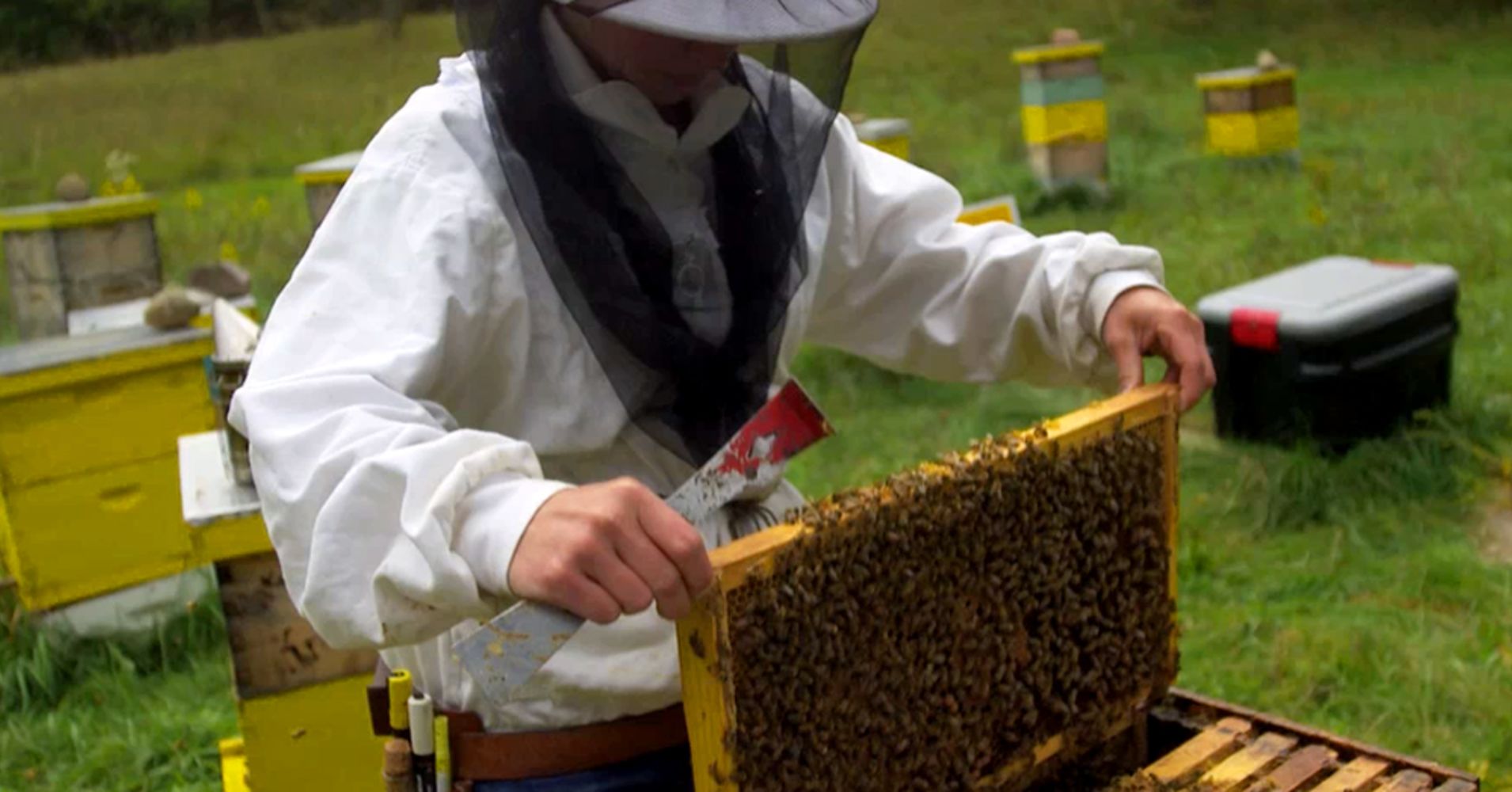
Most people associate the phrase “lean in” with Sheryl Sandberg’s manifesto on women in the corporate workplace. For beekeeper Kristy Allen of Minneapolis, the term means something quite different.
“When I was being educated about bees, someone once said, ‘You know a real beekeeper because they lean in instead of cower back,'” she says. “I immediately leaned in.” She recalls being hooked by both the smell and taste of real honey. “You’re outside, flowers are blooming, and … they’re buzzing all the time. It’s very meditative.”
That was 10 years ago. Today, Allen is the founder of The Beez Kneez, a unique business that maintains hives, sells honey, teaches intensive beekeeping classes and, generally speaking, manages to thrive — current annual revenue: $200,000 — while maintaining environmentally sustainable practices.
More from The Story Exchange:
This woman candidate took on Minnesota’s male power structure, and lost. She’s not sorry
A surf therapist builds a ‘really beautiful thing’ for trauma survivors
How this woman entrepreneur found decades of success in selling cakes
This is not your typical “sell honey at the farmers market” type of business. Many beekeepers are hobbyists, tending to bees on nights or weekends while holding a job in another field. Not Allen.
A 2008 graduate of the University of Minnesota, Allen decided early on she wanted to make a living in agriculture. “I’m a hard worker … and I’ve always wanted to spend my profession outside,” she says. But more than that, as a global studies major, she was drawn to social issues and — perhaps idealistically — fixing large-scale problems like lack of access to affordable food. The plight of the bee, she realized, is intrinsically linked to public health, especially for people of lower income.
Environmentalists have been concerned for decades about the drastic drop in the number of pollinators: bees, butterflies, bats and other animal species who pollinate food crops. In recent years, bees’ health has been severely compromised by mites, the overuse of pesticides and other factors, such as the mysterious malady called Colony Collapse Disorder. Their downturn, in turn, impacts global food security.
Bees “pollinate a third of everything that we eat,” Allen says. “Without bees, who’s gonna do that very important pollination work of making those plants reproduce?” It’s not a stretch to imagine a world where “only the very rich would probably get to eat things like strawberries,” she says. “These things we kind of take for granted — apples, watermelons, any fruit — would be gone.”
Allen first learned to work with bees on post-graduate stints with the AmeriCorps program in Arkansas and then Ecuador. Then in 2009, she came back to the U.S. to work for her aunt, who had married a commercial beekeeper in northern Minnesota.
While Allen initially wanted to go into farming, “I was really inspired by the way that bees work,” she says. “It’s an all-female run organization. They dance to communicate.” She read a book called “Honeybee Democracy” by Thomas D. Seeley, a leading researcher, on how bees make decisions collectively. “It blew my mind,” she says. While working as a bartender to make ends meet, Allen decided: “I’m gonna be a beekeeper.”
Figuring out her business model would be the next challenge. When your livelihood is “dependent upon something that is dying or struggling to survive, it’s a pretty big gamble you’re taking,” she says. She knew she’d need several different streams of revenue to make it.
She began that fall by selling her aunt and uncle’s honey via bicycle throughout Minneapolis. Because it was close to Halloween, she decided as a marketing gimmick to wear a bee costume. “I put on some striped socks, I got some pipe cleaners and some foam balls, and at 30 years old,” she pauses to laugh, “I dressed up like a bee and handed out business cards with honey samples.” It worked. Customers to this day include local restaurants, coffee shops and food co-ops who saw her cycle by in that getup. She dubbed her pedal-powered business The Beez Kneez.
Next, Allen decided she needed a “honey house,” a term that describes a structure where honey is extracted and processed for sale. After taking a business course via Women Venture, a women’s business center run by the Small Business Administration, Allen launched a Kickstarter campaign in 2013. The goal? Turn an old carpet factory — “a big concrete box,” she says — in the Cedar-Riverside neighborhood, smack in the middle of the Twin Cities, into her honey house. The campaign successfully raised close to $40,000. The property now serves as The Beez Kneez headquarters and a place hobby beekeepers can come process their honey. “We charge by the hour and do the clean-up afterward,” she says. “It’s very sticky.”
These days, Allen tends to 130 hives in and around Minneapolis. Some hives are owned by local universities, who pay an annual maintenance fee to The Beez Kneez. Each spring, she and another beekeeper teach a 14-week course on beekeeping called Camp Beez Kneez. Tuition is close to $600. Last year, about 40 students signed up, and this past season, “we [had] a waitlist,” she says.
And Allen is most proud of a device she invented called the Beez Kneez Honey Cycle, which she more recently put on the market. Many beekeepers use a hand-crank, something like a butter churner, to extract honey, which is “really awkward to use,” she says. Allen worked with a mechanical friend to design a pedal-powered version, which looks something like a stationary bike with a giant tank on it, for extracting and filtering honey. She has sold a few extractors (retail price: $2,000) and hopes to raise funds to properly advertise the product.
“I don’t know any other bee operation running like this,” she says. “I hope it grows to a point where it can sustain itself, and continue to do really good work with community.”
This article originally appeared on The Story Exchange.
Like this story? Subscribe to CNBC Make It on YouTube!

